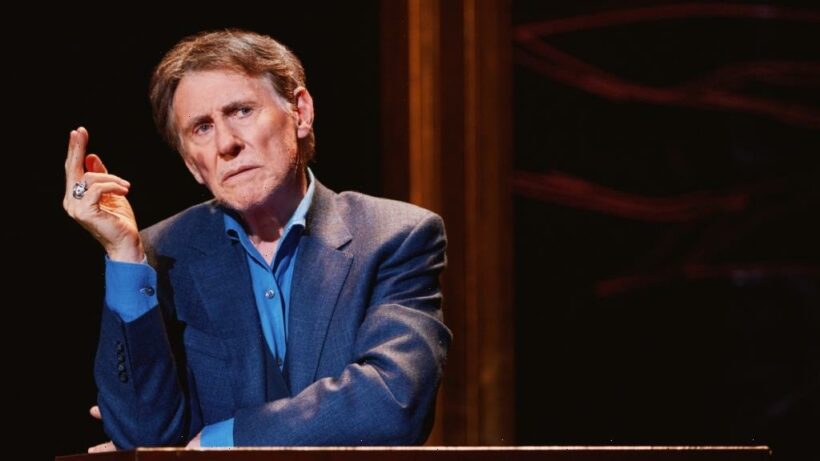Who better to tell your story than … you? Gabriel Byrne won kudos for his intimate memoir “Walking with Ghosts,” which he subsequently adapted into this heartfelt solo show now playing on Broadway.
One nagging question: Whenever did the actor-playwright find the time to write his memoir, script the stage adaptation, and assume the narrative voice himself? His craggy face – painfully sensitive in the way of Irish faces – is familiar from about a hundred movies and TV shows. (Not such a big exaggeration; he’s actually appeared in more than 80 movies.) And once this limited stage engagement is over, we’ll be seeing him on film in the role of Samuel Beckett in “Dance First.”
Despite the abundance of other projects, this polished but informal program (unobtrusively directed by Lonny Price) of personal anecdotes, private memories and rueful reflections on his life seems special. Opening with a remembered dream of a visit home to Dublin, he calls himself “a ghost boy,” surveying the once familiar landscape and “belonging everywhere but nowhere at all.”
As a writer, Byrne is no Brendan Behan, but the sincerity of his voice is a fine cover for whatever artlessness it disguises. And there are moments when he really hits his mark, as with the image of himself as a child, saying his prayers and trying to catch a glimpse of his guardian angel, “standing by the bed to protect me from all the dangers of the night.” In such moments he sounds like his own guardian angel, protecting his boyish self from the darkness to come as a grown man.
These sketches of childhood aren’t so special. (The universal curse of storytelling is the storyteller’s belief that his childhood was, indeed, special.) But never mind. There’s a lovely note of sympathy in his voice when he speaks as his own mother, reflecting on “poor Mrs. Brown,” mother of many, whose only holiday was resting in the hospital after giving birth to yet another baby.
There’s honest humor, as well, in his persistent memory of a friend of his mother who took pleasure in frightening the boy so badly — “I heard tell of a young fella leaned out of a train window and the express came along and took the head clean off him” — that he’d wet the bed.
And what would an Irish Catholic boyhood be without a yarn or two about the sadistic nuns who taught him? One memorable tale came from a nun who put the love of God into her first communion class by telling them of the little girl who was so excited about “the ecstasy of her first communion” that she dropped dead on the spot.
Ah, those nuns and priests who figured so prominently in Byrne’s youth. The word “spellbinding” comes to mind about the poor lad’s harrowing history as a Catholic schoolboy. (And I confess to being disappointed at the end of Act One, because I knew that he would be all grown up in Act Two.)
This is not to put the curse on Act Two. Once caught up in the actor’s mesmerizing voice, no single horror story will break the spell. Not his short-lived career as a plumber. Or his youthful plans (also broken – and for good reason, we learn) to become a priest. He wasn’t much more successful as a dishwasher, either. But he missed a great opportunity by neglecting to tell us about his adventures as a toilet attendant at a major Dublin hotel. “You learn a lot about yourself by working as a toilet attendant,” he informs us – before skipping past that topic without a single anecdote.
So, no toilet stories in Act Two, but some fond recollections of his early years as an amateur actor learning all the wrong lessons about acting. (“That Marlon Brando has a lot to answer for.”) He’s also amusing about his earnest efforts to become a “real” actor, although it’s hard to sustain the humor once he does, indeed, hit his professional mark. And although he gets us all worked up with anticipation when he connects with Richard Burton, he has no follow-through.
It isn’t until the end of the piece that he turns to his father and mother with some detailed recollections that — spoiler alert — are just too sad a note to end the show on.
Read More About:
Source: Read Full Article
